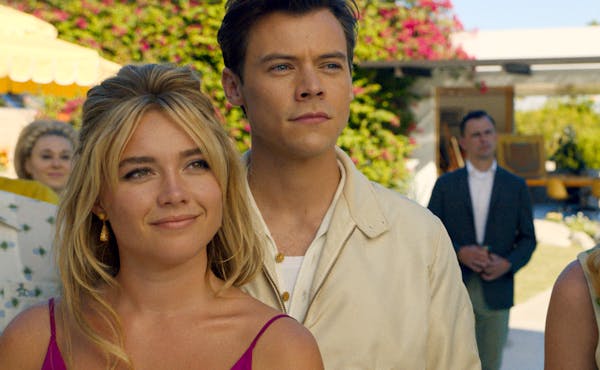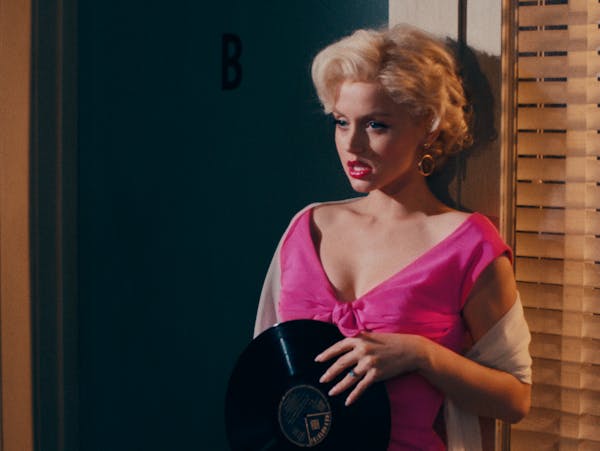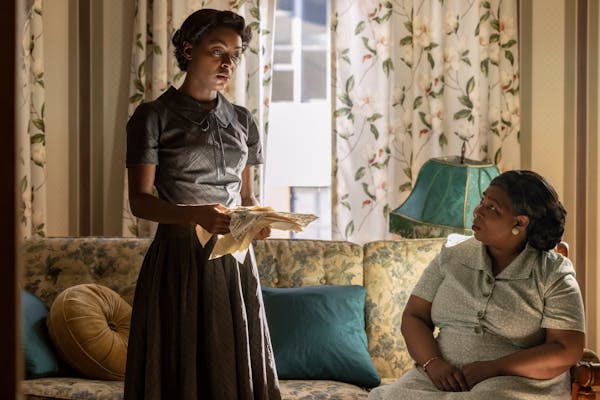Yes, "Bros" is a rare Hollywood romantic comedy that's about gay people but what's even more rare is that it has big, big laughs.
I can't remember the last time I belly-laughed at a movie as much as I did at "Bros," which Billy Eichner co-wrote (with director Nicholas Stoller) and stars in. The big laughs mostly come in the form of observations about gay life or culture in general (or both, such as a fictitious holiday TV movie about bisexuals called "Christmas With Either"). The movie isn't as dead-on as this year's "Fire Island" in its frankness about what it's like to be gay and single in 2022 — getting out of bed right after sex with your underwear on? Really, "Bros?" — but it is very, very funny.
Eichner plays Bobby, a brash podcaster and museum director who has decided he's OK with being single because "I love my freedom. I love my independence." If you think the lady doth protest too much, you're right, which quickly becomes evident when Bobby meets taciturn jock Aaron (Luke Macfarlane), who is completely unlike him in a way that seems to make sense.
Bobby and Aaron are like that old line about Ginger Rogers giving Fred Astaire sex appeal and him giving her class, except substitute "confidence" and "comfort." But this is a rom-com so, at least briefly, their differences get in the way enough that Bobby and Aaron split.
The best thing about "Bros" is that it does not feel like it's just a man/woman rom-com with the woman subbed out. "Bros" acknowledges that romance between men often works differently than it does with straight couples — or, as Bobby puts it, contradicting Lin Manuel Miranda's tediously noble allyship, "Love is love is not love." Bobby and Aaron don't meet or court or fight or take things to the next level like the characters in most rom-coms, which is all to the good.
When "Bros" errs, it's because it follows the rom-com formula so closely that you think it's about to make a sarcastic joke but then it doesn't. Not knowing how to end things, often a rom-com problem, it cycles through four mini-finales, three of which are terrible (the best, luckily, comes last). And there's one of those goofy, time-passing-while-in-love montages that, I kid you not, includes walking in autumn leaves, sharing a Thanksgiving turkey and picking out a Christmas tree. Maybe the idea is that these guys deserve that cliched montage as much as Julia Roberts and George Clooney do, but it's still a cliche.
The same thinking may be behind a big romantic gesture, singing a song of love, that comes at a public event that Bobby inappropriately makes all about himself. It's gross and it would leave a bad taste in your mouth if "Bros" didn't proceed to a better conclusion, one that takes the comedy past fantasy and into something resembling the real world.
As "Bros" ends, Bobby and Aaron remind us that, even if two very different people of any gender manage to find love, there's still a lot more work to do.
'Bros'
*** out of 4 stars
Rated: R for language and brief nudity.
Where: Area theaters.
A look back
Actor/writer Billy Eichner has made much of the fact that "Bros" is the "first gay studio romantic comedy." That's a lot of equivocation for one little phrase and it's not exactly true anyway. But it does offer an excuse to note that gay characters have been part of romantic comedies since they were invented (and have been the leads in many rom-coms made outside the studio system, including "Go Fish" and "The Broken Hearts Club").
1930s/40s: A gay character, usually a man and often played by Franklin Pangborn, pops up as a hotel clerk or department store salesman in just a couple scenes of many romantic comedies, not so subtly flirting with the (uninterested) leading man.
1960s: The Hays Code, a Hollywood system of self-censorship, forbade controversial behavior for decades but cracks emerged in '60s rom-coms when Doris Day often had a boss or neighbor who was coded as gay even if he wasn't out. Now promoted to an actual supporting character with a name, he was played by someone like Tony Randall or Terry-Thomas.
1990s: Rupert Everett was among the first semi-stars who came out and he's the platonic bestie in "My Best Friend's Wedding," the 1997 smash that established "gay best friend" as a rom-com requirement. The same year also brought "In & Out," a gay studio romantic comedy whose stars, including Kevin Kline and Tom Selleck, are straight in real life (its most prominent gay artist was writer Paul Rudnick).
2020: One of the movies that debunks Eichner's claim is holiday rom-com "Happiest Season," financed by major studio TriStar Pictures. It shifted to Hulu because of COVID-19 but, like "Bros," it boasts big, out stars including Kristen Stewart and Dan Levy.








